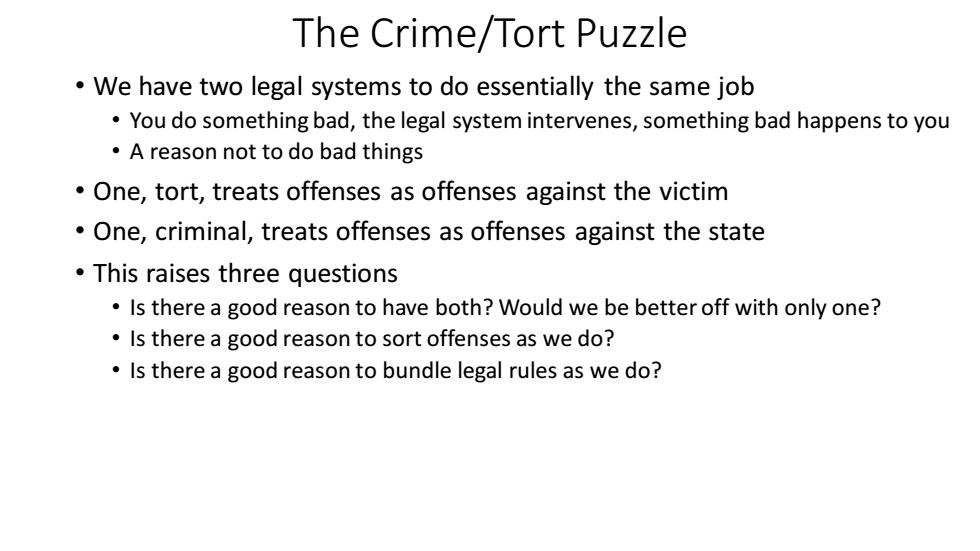
The Crime/Tort Puzzle We have two legal systems to do essentially the same job You do something bad,the legal system intervenes,something bad happens to you A reason not to do bad things One,tort,treats offenses as offenses against the victim One,criminal,treats offenses as offenses against the state This raises three questions Is there a good reason to have both?Would we be better off with only one? Is there a good reason to sort offenses as we do? Is there a good reason to bundle legal rules as we do?
The Crime/Tort Puzzle • We have two legal systems to do essentially the same job • You do something bad, the legal system intervenes, something bad happens to you • A reason not to do bad things • One, tort, treats offenses as offenses against the victim • One, criminal, treats offenses as offenses against the state • This raises three questions • Is there a good reason to have both? Would we be better off with only one? • Is there a good reason to sort offenses as we do? • Is there a good reason to bundle legal rules as we do?

Should We Abolish the Criminal Law? Imagine a pure tort system ·Problems The victim may not have the resources to prosecute. Some offenses cause diffuse injury Offenders may be judgement proof One could have legal rules making that less likely The state could pay the fine and imprison the offender-still mostly tort Potential victims could commit in advance to buy deterrence,as in 18th c.England The fine for a crime is both the punishment for the criminal and the reward for the victim We want the optimal probability/punishment pair But setting the punishment sets the probability,since it determines the payoff to catching him We cannot separately control two functions with one variable The fancy solution,using profit maximization for an additional constraint,is an article on my web page The simple answer is that the identical problem exists for ordinary tort law
Should We Abolish the Criminal Law? • Imagine a pure tort system • Problems • The victim may not have the resources to prosecute. • Some offenses cause diffuse injury • Offenders may be judgement proof • One could have legal rules making that less likely • The state could pay the fine and imprison the offender—still mostly tort • Potential victims could commit in advance to buy deterrence, as in 18th c. England • The fine for a crime is both the punishment for the criminal and the reward for the victim • We want the optimal probability/punishment pair • But setting the punishment sets the probability, since it determines the payoff to catching him • We cannot separately control two functions with one variable • The fancy solution, using profit maximization for an additional constraint, is an article on my web page • The simple answer is that the identical problem exists for ordinary tort law

Sorting Offenses Do we allocate offenses correctly to the two system? Tort law for offenses where we know who did it Landes/Posner argument That eliminates the probability/punishment problem for catching the offender But the chance of winning a tort suit depends on how much you are willing to spend Judgement proof argument If it is hard to catch the offender,we need a big fine to provide adequate deterrence Which the offender may not be able to pay And catching him is expensive,so we also need a big fine to make it worth doing On the other hand,torts are more likely than crimes to be anonymous victim And the torts we see litigated are the ones easy to detect
Sorting Offenses • Do we allocate offenses correctly to the two system? • Tort law for offenses where we know who did it • Landes/Posner argument • That eliminates the probability/punishment problem for catching the offender • But the chance of winning a tort suit depends on how much you are willing to spend • Judgement proof argument • If it is hard to catch the offender, we need a big fine to provide adequate deterrence • Which the offender may not be able to pay • And catching him is expensive, so we also need a big fine to make it worth doing • On the other hand, torts are more likely than crimes to be anonymous victim • And the torts we see litigated are the ones easy to detect

Bundling Legal Rules The same person controls prosecution and collects fines That makes sense,since otherwise the controller takes a bribe to drop the case But it creates an opportunity for fraudulent prosecution More efficient punishments go with a lower standard of proof Makes sense,since errors have lower social cost,but... An efficient punishment is an incentive for fraudulent prosecution Which is easier with a lower standard of proof
Bundling Legal Rules • The same person controls prosecution and collects fines • That makes sense, since otherwise the controller takes a bribe to drop the case • But it creates an opportunity for fraudulent prosecution • More efficient punishments go with a lower standard of proof • Makes sense, since errors have lower social cost, but … • An efficient punishment is an incentive for fraudulent prosecution • Which is easier with a lower standard of proof
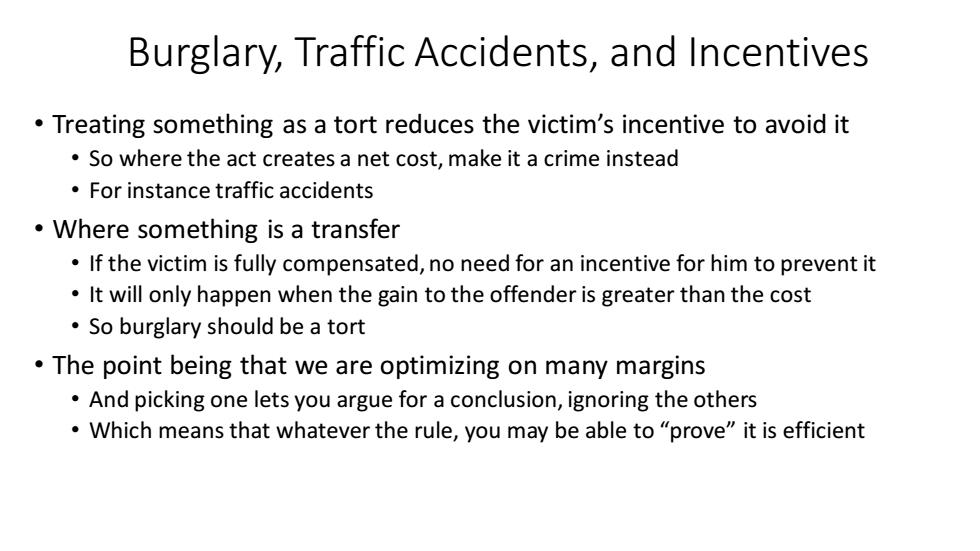
Burglary,Traffic Accidents,and Incentives Treating something as a tort reduces the victim's incentive to avoid it So where the act creates a net cost,make it a crime instead For instance traffic accidents Where something is a transfer If the victim is fully compensated,no need for an incentive for him to prevent it It will only happen when the gain to the offender is greater than the cost So burglary should be a tort The point being that we are optimizing on many margins And picking one lets you argue for a conclusion,ignoring the others Which means that whatever the rule,you may be able to "prove"it is efficient
Burglary, Traffic Accidents, and Incentives • Treating something as a tort reduces the victim’s incentive to avoid it • So where the act creates a net cost, make it a crime instead • For instance traffic accidents • Where something is a transfer • If the victim is fully compensated, no need for an incentive for him to prevent it • It will only happen when the gain to the offender is greater than the cost • So burglary should be a tort • The point being that we are optimizing on many margins • And picking one lets you argue for a conclusion, ignoring the others • Which means that whatever the rule, you may be able to “prove” it is efficient
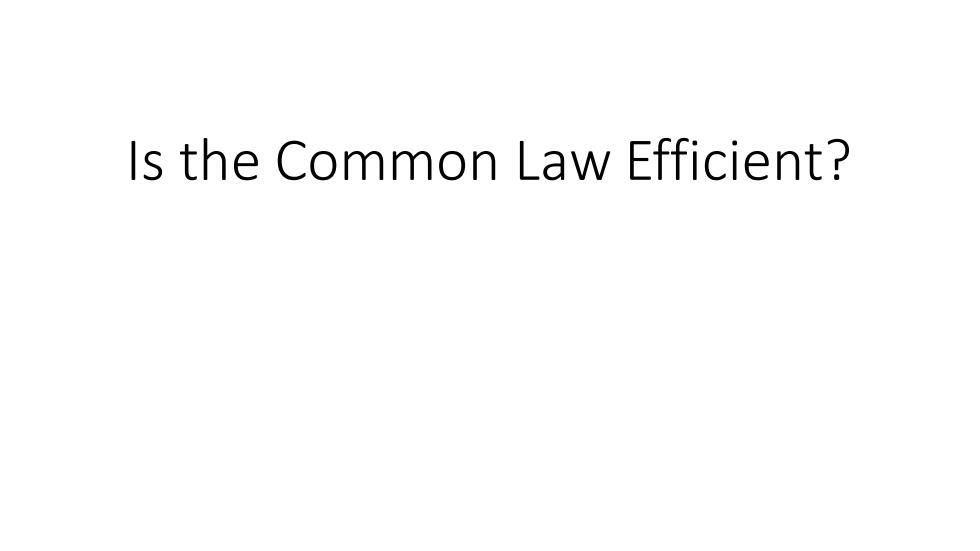
Is the Common Law Efficient?
Is the Common Law Efficient?
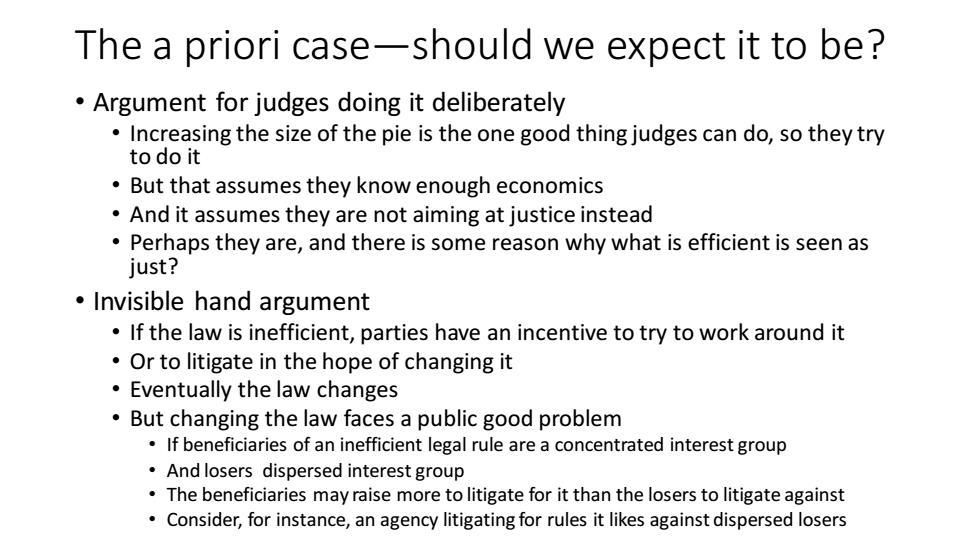
The a priori case-should we expect it to be? Argument for judges doing it deliberately Increasing the size of the pie is the one good thing judges can do,so they try to do it But that assumes they know enough economics And it assumes they are not aiming at justice instead Perhaps they are,and there is some reason why what is efficient is seen as just? Invisible hand argument If the law is inefficient,parties have an incentive to try to work around it Or to litigate in the hope of changing it Eventually the law changes But changing the law faces a public good problem If beneficiaries of an inefficient legal rule are a concentrated interest group And losers dispersed interest group The beneficiaries may raise more to litigate for it than the losers to litigate against Consider,for instance,an agency litigating for rules it likes against dispersed losers
The a priori case—should we expect it to be? • Argument for judges doing it deliberately • Increasing the size of the pie is the one good thing judges can do, so they try to do it • But that assumes they know enough economics • And it assumes they are not aiming at justice instead • Perhaps they are, and there is some reason why what is efficient is seen as just? • Invisible hand argument • If the law is inefficient, parties have an incentive to try to work around it • Or to litigate in the hope of changing it • Eventually the law changes • But changing the law faces a public good problem • If beneficiaries of an inefficient legal rule are a concentrated interest group • And losers dispersed interest group • The beneficiaries may raise more to litigate for it than the losers to litigate against • Consider, for instance, an agency litigating for rules it likes against dispersed losers
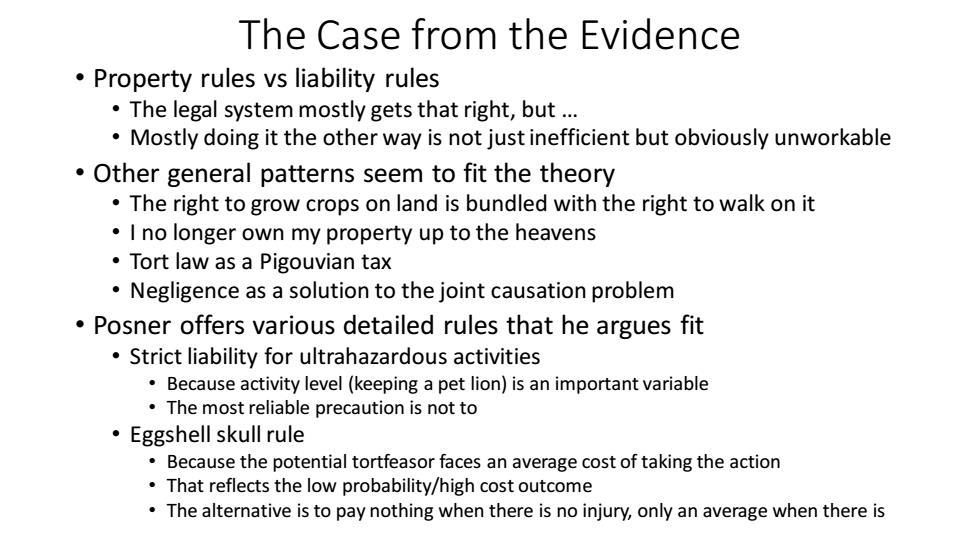
The Case from the Evidence Property rules vs liability rules The legal system mostly gets that right,but... Mostly doing it the other way is not just inefficient but obviously unworkable Other general patterns seem to fit the theory The right to grow crops on land is bundled with the right to walk on it I no longer own my property up to the heavens Tort law as a Pigouvian tax Negligence as a solution to the joint causation problem Posner offers various detailed rules that he argues fit Strict liability for ultrahazardous activities Because activity level(keeping a pet lion)is an important variable The most reliable precaution is not to ·Eggshell skull rule Because the potential tortfeasor faces an average cost of taking the action That reflects the low probability/high cost outcome The alternative is to pay nothing when there is no injury,only an average when there is
The Case from the Evidence • Property rules vs liability rules • The legal system mostly gets that right, but … • Mostly doing it the other way is not just inefficient but obviously unworkable • Other general patterns seem to fit the theory • The right to grow crops on land is bundled with the right to walk on it • I no longer own my property up to the heavens • Tort law as a Pigouvian tax • Negligence as a solution to the joint causation problem • Posner offers various detailed rules that he argues fit • Strict liability for ultrahazardous activities • Because activity level (keeping a pet lion) is an important variable • The most reliable precaution is not to • Eggshell skull rule • Because the potential tortfeasor faces an average cost of taking the action • That reflects the low probability/high cost outcome • The alternative is to pay nothing when there is no injury, only an average when there is
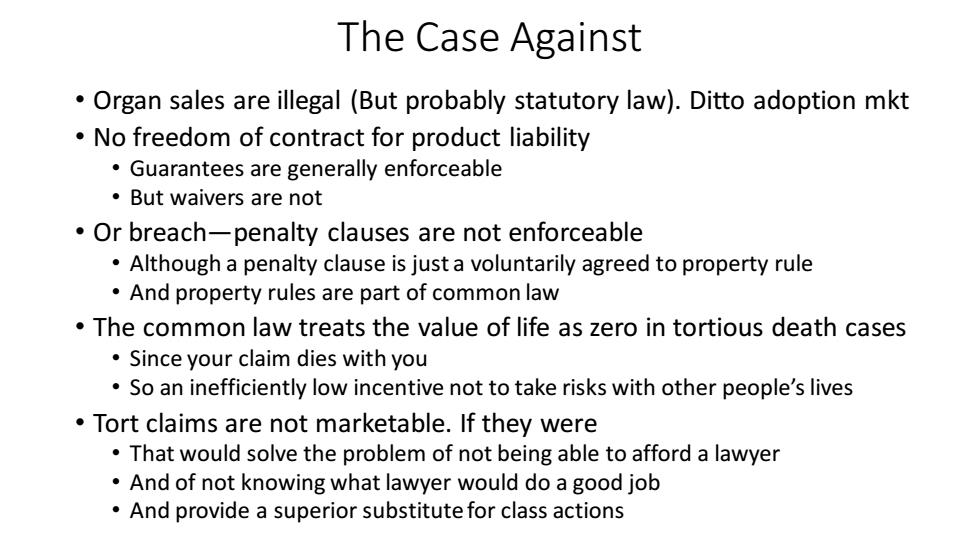
The Case Against Organ sales are illegal(But probably statutory law).Ditto adoption mkt No freedom of contract for product liability Guarantees are generally enforceable ·But waivers are not Or breach-penalty clauses are not enforceable Although a penalty clause is just a voluntarily agreed to property rule And property rules are part of common law The common law treats the value of life as zero in tortious death cases Since your claim dies with you So an inefficiently low incentive not to take risks with other people's lives Tort claims are not marketable.If they were That would solve the problem of not being able to afford a lawyer And of not knowing what lawyer would do a good job And provide a superior substitute for class actions
The Case Against • Organ sales are illegal (But probably statutory law). Ditto adoption mkt • No freedom of contract for product liability • Guarantees are generally enforceable • But waivers are not • Or breach—penalty clauses are not enforceable • Although a penalty clause is just a voluntarily agreed to property rule • And property rules are part of common law • The common law treats the value of life as zero in tortious death cases • Since your claim dies with you • So an inefficiently low incentive not to take risks with other people’s lives • Tort claims are not marketable. If they were • That would solve the problem of not being able to afford a lawyer • And of not knowing what lawyer would do a good job • And provide a superior substitute for class actions

The Case for Ignorance Economic arguments are complicated My crime/tort chapter ran the argument through seven rounds This is why you could have a pure tort system This is why it wouldn't work This is how that problem would be dealt with ·This… Once you know the legal rule,you can usually find some argument that it is efficient Coming to the nuisance A good rule,because it is cheaper to move a housing development or pig farm before it is built A bad rule,because my pig farm gives me control over land that will later be wanted for housing So I have a rent seeking argument to build the pig farm now where you will want to build housing later The Himalayan photographer and the Eggshell Skull The economic logic of two problems is the same The legal answer is different And each time Posner concludes that the legal answer is correct Conclusion:The jury is still out There is some evidence that the common law tends towards efficient rules But also evidence against And arguments,but not compelling ones,for why we might expect it to
The Case for Ignorance • Economic arguments are complicated • My crime/tort chapter ran the argument through seven rounds • This is why you could have a pure tort system • This is why it wouldn’t work • This is how that problem would be dealt with • This … • Once you know the legal rule, you can usually find some argument that it is efficient • Coming to the nuisance • A good rule, because it is cheaper to move a housing development or pig farm before it is built • A bad rule, because my pig farm gives me control over land that will later be wanted for housing • So I have a rent seeking argument to build the pig farm now where you will want to build housing later • The Himalayan photographer and the Eggshell Skull • The economic logic of two problems is the same • The legal answer is different • And each time Posner concludes that the legal answer is correct • Conclusion: The jury is still out • There is some evidence that the common law tends towards efficient rules • But also evidence against • And arguments, but not compelling ones, for why we might expect it to